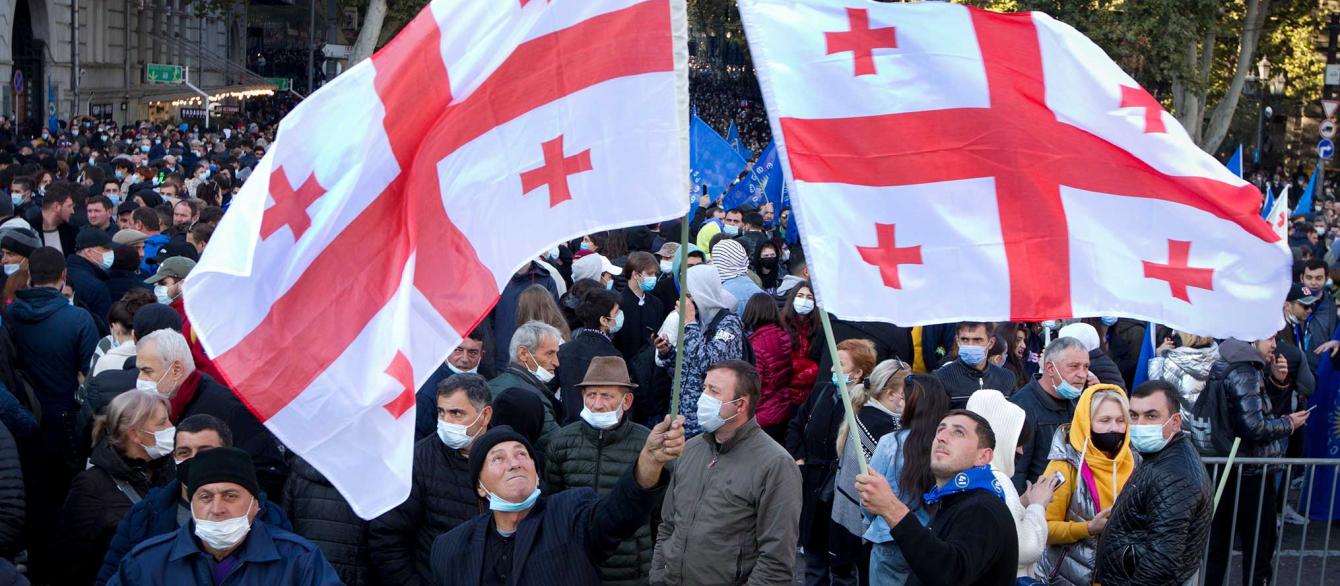Georgia’s politics has always been operatic, a blend of comedy and tragedy. Like opera, it is a performance for and by elites. The latest drama was the secret arrival in Georgia of Mikheil Saakashvili, who, on the eve of crucial municipal elections in Georgia, was detained by Georgian police and dispatched to prison in the provincial city of Rustavi. Runoffs in the country’s major cities are to take place at the end of this month. He faces years behind bars for crimes (abuse of power) allegedly committed when he was president (2004–2013). Writing from his cell, Saakashvili, who is in poor health due to a hunger strike, claimed he came back “to help our people restore freedom and democracy.” Georgian Prime Minister Irakli Gharibashvili insisted Saakashvili’s real purpose was to overthrow the government in a planned mass demonstration on October 3.
The Georgian saga goes on. Oversized dramatis personae have dominated the stage for the last thirty years: Zviad Gamsakhurdia, Eduard Shevardnadze, Saakashvili, and lastly, billionaire Bidzina Ivanishvili—all former presidents or prime ministers. They all created parties that, despite claims they would improve democratic representation and accountability to citizens, degraded into dominant one-party regimes that sustained power by infiltrating the economy, managing the judiciary, extending patronage networks, and ensuring command over electoral resources.
One-Party Systems
This is not a pattern unique to Georgia. Dominant one-party systems have emerged elsewhere in promising democracies like Hungary and Poland. In Japan, the ruling Liberal Democratic Party has governed the country largely unchallenged since World War II. We see versions of a single-party hegemony at the state level in the United States, where partisan gerrymandering proves that if you control the legislature and state resources, you can manipulate election rules, electoral districts, and even the judiciary to make your party practically immovable.
Despite these systemic flaws, we sold our electoral practice to Georgia, and with it, the delusion that it would make the Georgian legislature and its government more accountable and more democratic. Yet over the last thirty years of Georgian independence, despite or perhaps because of persistent changes to electoral rules (no Georgian election has taken place under the same electoral code), elections have only increased popular distrust of government. National parliamentary elections, rather than making politicians accountable, stimulating greater participation, or channeling politics into a consensual public space, have led to revolutions, boycotts, and polarization. Freedom House, a U.S.-based non-profit which measures democracy in states around the world, writes that “free and fair elections are a foundational component of political freedom.” Yes, perhaps, but are they a defining feature of democracy? Even the U.S. embassy in Georgia, in a harsh assessment of the October 2 elections, declared “the election process is about more than Election Day.”
Quasi-Democratic Elections
Paradoxically, U.S. elections increasingly resemble those in Georgia (we thought it would be the other way round). They are deeply unfair in both countries, plagued by the power of money and enormous economic and educational inequalities among voters. Access to the media is inequitable, populist messaging dominates the airwaves, and social media works on its hidden persuasion. Limited choice (despite multiple small parties in Georgia), the manipulation of electoral rules, and the lack of outcomes generate disillusion and low turnouts (51.4 percent in the Georgian October 2 election).
Given all this, why do the EU and the United States continue to insist that elections are the linchpin in Georgia’s democracy? Have elections led to greater accountability and greater control by Georgia’s citizens? Do citizens participate in decision-making? There is little evidence that they do. Georgia’s electoral system consistently fails its citizens. The lack of responsive parties and overblown party rhetoric adds to the problem. Georgia’s parties mobilize crowds, generate indignation, and insult their opponents, leading to polarization and non-cooperation. Polls show that citizens’ knowledge of what the parties are actually offering is very low. To revert to the opera metaphor—Georgian party leaders resemble “heroic” caricatures, singing with librettos that have no connection to the real world of their constituents.
Open Democracy?
Over the last three decades, Western democracy aid in Georgia has focused on elections as the instrument for expanding democracy. But elections, despite multiple attempts at reform and millions of aid dollars to Georgian parties, have proven inadequate. In 2021, Georgia was still in Freedom House’s “partly free” category. It is time to rethink. More than a century ago, the leaders of the first Georgian republic (1918–21) proposed an imaginative alternative to parliamentary politics. They called it a “democratic republic,” which would implement “people’s political self-government.”
The people, through its representatives, would not only make laws but participate “in the implementation of laws.” Power would not be “gathered by the center, but … divided between the center and the periphery.” The ideas never came to fruition due to the Russian civil war and Bolshevik intervention, but the notion of citizen self-government was a central tenet in the state’s institutional structure.
This idea has taken on new energy in recent decades, stimulated by an increasingly unequal system where access to power and economic opportunity have become sources of popular resentment and political instability. Georgia is a prime example. Hélène Landemore of Yale University, building on concepts of “popular power” and deliberative democracy, has proposed a system of “open democracy” in which the minority of professionalized politicians would be checked and balanced by a majority of ordinary citizens, who would guide and participate in government policy. She points to examples of “open democracy” in Belgium, Ireland (Citizens’ Assemblies), Iceland (where a new constitution was drawn up by over 900 of Iceland’s citizens), and even the United States, where a Citizens Initiative Review in Oregon determines which ballot questions are presented to Oregon’s citizens.
More than a century ago, the leaders of the first Georgian republic (1918–21) proposed an imaginative alternative to parliamentary politics. They called it a “democratic republic,” which would implement “people’s political self-government.”
A New Approach is Needed
Every place is different. Georgia is not Iceland—and even in Iceland, the citizen-based constitutional changes were halted by Iceland’s parliament—but in opinion polling, Georgia’s parties persistently rank low on the scale of public trust. If U.S. agencies and the EU want to keep Georgia in the democratic camp, then they should offer strong incentives to parliament (and to parties that are willing to cooperate) to work with Georgia’s active civil society organizations to create new citizen-based institutions. Landemore calls them “mini-publics,” or public bodies where ordinary citizens deliberate, check, expose, and instruct—whether it is town planning, environmental control, judicial appointments, or constitutional changes.
The October 2021 elections and the recent spectacle provided by Georgian Dream and the United National Movement are just the latest illustration of why Georgia needs new citizen-based participatory institutions to ensure popular participation and control. Only on that basis will we see a strong and sustainable democracy in Georgia.
This piece originally appeared in PONARS EURASIA on October 24, 2021.






